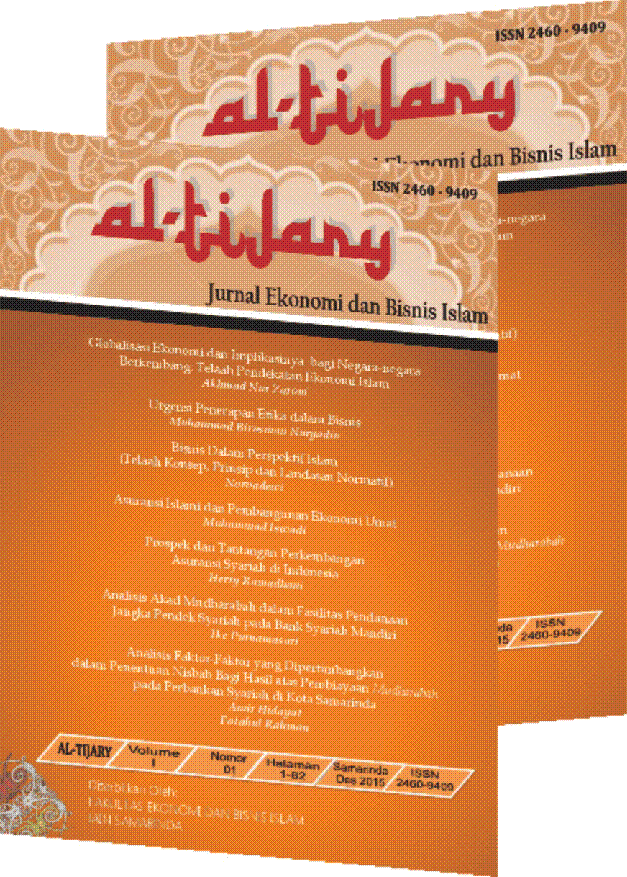GoFood Vs ShopeeFood: Manakah yang Menjadi Pilihan Generasi Z?
Abstract
The presence of online food delivery platform makes it easier for people to order food online without having to come directly to the restaurant. This study aims to ascertain Generation Z's preference for online food delivery between ShopeeFood and GoFood based on the notion of the marketing mix from an Islamic economics perspective. A comparative descriptive methodology was adopted. The research participants at the time were Generation Z from Semarang City. About the sample that was obtained through accidental sampling under non-probability sampling. While research data was gathered from observations, questionnaires, observations, interviews, and documentation. According to the findings, Generation Z prefers ShopeeFood over GoFood. From a sharia economic perspective, this can be seen in the 7P marketing mix, which includes: pragmatism & product aspects, which explain that even though there are more GoFood merchants, Generation Z prefers ShopeeFood because the necessary menu options are also available in the market, while the pertinence & promotion aspect, which explains ShopeeFood offers more promos even though it claims the promo is easier on GoFood, and the palliation & price aspect, where Shop. The results are not significantly different for the factors of persistence and process, patience and environment, peer support and people, pedagogy and environment, and so on. The implications of this study for both platforms need to expand the reach of merchants so that the availability of popular menus at competitive prices can strengthen promotional strategies and can be an important factor to maintain consumer satisfaction.
References
Abubakar, R. (2021). Pengantar Metodologi Penelitian. SUKA-Press UIN Sunan Kalijaga.
Ahmaddien, I., & Widati, E. (2019). Pengaruh Kualitas Pelayanan, Kualitas Produk Dan Keputusan Pembelian Terhadap Loyalitas Pelanggan Go Food Melalui Variabel Kepuasaan. Jurnal Intekna: Informasi Teknik Dan Niaga, 19(1), 40–45.
Amir, A. M. (2020). The Impact of Food Quality, Service Quality, and Physical Environment Toward Customer Satisfaction on KFC. Jurnal Ilmiah Mahasiswa FEB Umiversitas Brawijaya, 9(2).
Ansari, R. T., & Nurasik. (2021). Go-Jek and Grab Driver’s Income in Sidoarjo Regency Before and During The Covid-19 Pandemic. Emergent: Journal Of Educational Discoveries And Lifelong Learning (EJEDL), 2(4), 11–23. https://doi.org/2776-0995
Assauri, S. (2017). Strategik Management: Sustainable Competitive Adventages. PT Rajagrafindo Persada.
Atmoko, T. P. H. (2018). Strategi Pemasaran untuk Meningkatkan Volume Penjualan di Cavinton Hotel Yogyakarta. Journal of Indonesian Tourism, Hospitality and Recreation, 1(2), 83–96. https://doi.org/10.17509/JITHOR.V1I2.13769
Ayaumi, R. S., & Komariah, N. S. (2021). Pengaruh Customer Experience dan Trust Terhadap Minat Beli Ulang Layanan Pesan Antar Gofood Saat Pandemi Covid-19 Pada Generasi Z. Jurnal Ilmiah Manajemen Ubhara, 3(2), 181–192.
Az-zahra, H. N., Tantya, V. A., & Apsari, N. C. (2021). Layanan Online Food Delivery dalam Membantu Meningkatkan Penjualan Pada Usaha Mikro. Jurnal Penelitian Dan Pengabdian Kepada Masyarakat (JPPM), 2(2), 156–165. https://doi.org/10.24198/JPPM.V2I2.33513
Babar, Y., Adeli, A., & Greenwood, B. N. (2021). Cooking or Clicking: The Impact of Online Food Delivery Platforms on Domestic Food Preparation. SSRN. https://doi.org/10.2139/ssrn.3833938
Chai, L. T., & Yat, D. N. C. (2019). Online Food Delivery Services: Making Food Delivery the New Normal. Journal of Marketing Advances and Practice, 1(1), 62–77.
Chotigo, J., & Kadono, Y. (2021). Comparative Analysis of Key Factors Encouraging Food Delivery App Adoption Before and During the COVID-19 Pandemic in Thailand. Sustainability, 13(8). https://doi.org/10.3390/su13084088
Faizah, F. N. (2022). Eksistensi Bisnis Kuliner Halal Melalui Digital Marketing di Era New Normal. SERAMBI: Jurnal Ekonomi Manajemen Dan Bisnis Islam, 4(1), 85–98. https://doi.org/10.36407/SERAMBI.V4I1.513
Fathoni, M. A. (2018). Konsep Pemasaran dalam Perspektif Hukum Islam. Jurisdictie: Jurnal Hukum Dan Syariah, 9(1), 128–146.
Fauzi, S., & Lina, L. F. (2021). Peran Foto Produk, Online Customer Review, Online Customer Rating Pada Minat Beli Konsumen di E-Commerce. Jurnal Muhammadiyah Manajemen Bisnis, 2(1), 151–156.
Hidayatullah, S., Waris, A., Chris Devianti, R., Ratna Sari, S., Ardi Wibowo, I., & Made, P. P. (2018). Perilaku Generasi Milenial dalam Menggunakan Aplikasi Go-Food. Jurnal Manajemen Dan Kewirausahaan, 6(2), 240–249. https://doi.org/10.26905/jmdk.v6i2.2560
Hooi, R., Leong, T. K., & Yee, L. H. (2021). Intention to Use Online Food Delivery Service in Malaysia among University Students. Conference on Management, Business, Innovation, Education and Social Science, 1(1), 60–73.
Ikram, M. M. (2021). Keputusan Penggunaan Layanan Gofood Selama Masa Pandemi Covid-19. JIMKES: Jurnal Ilmiah Manajemen Kesatuan, 9(2), 279–292. https://doi.org/10.37641/jimkes.v9i2.467
Indriyani, D., & Sartika, H. (2022). Persepsi Generasi Z Pada Penggunaan E-Wallet Selama Pandemi Covid-19. Widya Cipta: Jurnal Sekretari Dan Manajemen, 6(1), 68–74. https://doi.org/10.31294/WIDYACIPTA.V6I1.12200
IPAddress. (2020). Gojek Super App: Ojek Online, Taksi Online, Pesan Makan, Kirim Barang, Pembayaran. IPAddress.Com. https://www.ipaddress.com/
Junida, A. I. (2022). Riset: Layanan Pesan-Antar Makanan Akan Tetap Tinggi Pascapandemi. Antaranews.Com. https://www.antaranews.com/
Kartika, N. E. (2020). Fitur Aplikasi Gojek Favorit Konsumen Pada Saat Pandemi COVID-19 di Kota Bandung. Jurnal Communio: Jurnal Jurusan Ilmu Komunikasi, 9(2), 1680–1695. https://doi.org/10.35508/jikom.v9i2.2922
Khotimah, K., & Jalari, M. (2021). Menguji Marketing Mix 7P Terhadap Keputusan Pembelian Shopee di Sukoharjo. Maker: Jurnal Manajemen, 7(1), 81–94.
Komalasari, S., Hermina, C., Muhaimin, A., Alarabi, M. A., Apriliadi, M. R., Rabbani, N. P. R., & Mokodompit, N. J. D. (2022). Prinsip Character of A Leader pada Generasi Z. Philantrophy: Journal of Psychology, 6(1), 77–91. https://doi.org/10.26623/PHILANTHROPY.V6I1.4960
Kotler, P., & Armstrong, G. (2020). Principles of Marketing. Pearson.
Lestari, I. (2020). Analisis Tingkat Kepercayaan dan Kepuasan Pelanggan terhadap Niat untuk Menggunakan Kembali Layanan Transportasi Online di Era Pandemi Covid-19. Equilibrium: Jurnal Ilmiah Ekonomi, Manajemen Dan Akuntansi, 9(1), 27–35.
Lungsae, S., & Maika, M. R. (2021). Pengembangan Layanan Aplikasi Go-Jek dalam Meningkatkan Kepuasan Pelanggan. Infomatek, 23(1), 7–20.
Manggoa, D. A., Bunga, M., & Fanggidae, R. P. C. (2020). Pengaruh Bauran Pemasaran Terhadap Keputusan Pembelian Konsumen (Studi Pada Pengguna Ojek Online GrabBike Di Kota Kupang). Journal of Management, 11(1), 1–18.
Maretha, F. Y., Margawati, A., Wijayanti, H. S., & Dieny, F. F. (2020). Hubungan Penggunaan Aplikasi Pesan Antar Makanan Online dengan Frekuensi Makan dan Kualitas Diet Mahasiswa. Journal of Nutrition College, 9(3), 160–168. https://doi.org/10.14710/JNC.V9I3.26692
Muslimin, S., Zainab, & Jafar, W. (2020). Konsep Penetapan Harga dalam Perspektif Islam. Al-Azhar Journal of Islamic Economics, 2(1), 1–11. https://doi.org/10.37146/AJIE.V2I1.30
Nugraha, A. (2020). Bisnis Pesan Antar Makanan: Persaingan Ketat Layanan Pengiriman Makanan. Kompas.Id. https://www.kompas.id/baca/telaah/2022/02/16/persaingan-ketat-layanan-pengiriman-makanan-1
Pahlevi, R. (2022). Survei: Nilai Transaksi GoFood Lebih Besar dari ShopeeFood dan GrabFood. Databoks. https://databoks.katadata.co.id/
Pangemanan, M. J., Saerang, D. P. E., & Maramis, J. B. (2022). Online Impulse Buying Konsumen E-commerce Generasi Z di Sulawesi Utara. Jurnal EMBA : Jurnal Riset Ekonomi, Manajemen, Bisnis Dan Akuntansi, 10(2), 1203–1210. https://doi.org/10.35794/EMBA.V10I2.41440
Paramita, S., Widayatmoko, & Irena, L. (2020). Generation Internet Model in Management of Media Institutions in Indonesia. Advances in Social Science, Education and Humanities Research, 439, 188–195.
Putri, N. S., Gunawan, J., & Wibawa, B. M. (2021). Identifikasi Faktor yang Mempengaruhi Niat Keberlanjutan Penggunaan Layanan Online Food Delivery di Masa Pandemi Covid-19. Jurnal Sains Dan Seni ITS, 10(1), D89–D94. https://doi.org/10.12962/j23373520.v10i1.60456
Rahmat, F., Rahmat, S. T. Y., Rhian, I., & Semerdanta, P. (2019). The Role of Service Quality and Customer Satisfaction: A Case Study for Applications of Go-Food. RJOAS: Russian Journal of Agricultural and Socio-Economic Sciences, 7(91), 263–269. https://doi.org/10.18551/rjoas.2019-07.30
Rajabion, L. (2018). Generation Z Students: Will They Change Our Computer Science and IT Classrooms. Systemics, Cybernetics and Informatics, 6(4), 8–12.
Rastati, R. (2018). Media Literasi Bagi Digital Natives: Perspektif Generasi Z di Jakarta. Kwangsan: Jurnal Teknologi Pendidikan, 6(1), 60–73. https://doi.org/10.31800/JTP.KW.V6N1.P60--73
Rifa’i, M. Z. R., & Zen, M. (2021). Strategi Marketing Mix dalam Menghadapi Persaingan Pasar: Studi Kasus Pada PT. Zamzam Sumbula Thoyyiba Tangerang Selatan. Journal Of Islamic Management, 1(2), 148–162.
Samia’an, M. I. H., & Jasmi, K. A. (2022). Konsep Halal dan Penjagaan Kualiti Produk dalam Islam. Prosiding Seminar Falsafah Sains Dan Ketamadunan, 1–8.
Saparso. (2021). Marketing Process: Menciptakan Nilai Bagi Pelanggan. Ukrida Press.
Shemi, H. (2019). Begini Lho Perilaku Belanja Gen Z, Kamu Termasuk Gak? IDN TIMES. https://www.idntimes.com/
Suherlan, P. R., & Hidayat, R. (2021). Faktor-Faktor yang di Pertimbangkan Konsumen Dalam Menggunakan Jasa E-Wallet Gopay. Jurnal Ilmu Komputer Dan Bisnis (JIKB), 12(2), 19–28.
Suryaningsih, I. B. (2019). Layanan Aplikasi Go-Jek: Validasi Skala Pengukuran IRSQ Persepsi Konsumen Pada Penggunaan Platform Go-Food. Bisma: Jurnal Bisnis Dan Manajemen, 13(2), 112–121. https://doi.org/10.19184/BISMA.V13I2.11684
Taufik, Masjono, A., Kurniawan, I., & Karno. (2020). Peranan Platform Food Delivery Service dalam Mendukung Marketing Mix UKM di Masa New Normal. Jurnal Pengembangan Wiraswasta, 22(2), 121–130. https://doi.org/10.33370/JPW.V22I02.426
Vania, I., & Simbolon, R. (2021). Pengaruh Promo Shopeefood Terhadap Minat Beli Pengguna Shopee (Di Daerah Tangerang Selatan). Jurnal Ekonomis, 14(2b), 46–58.
Wardani, P. A. K., Reinaldy, F. R., & Tyas, I. P. (2021). Analisis Faktor-Faktor Keputusan Pembelian Makanan dengan Menggunakan Jasa ShopeeFood. Literasi: Jurnal Kajian Keislaman Multi-Perspektif, 2(1), 163–192. https://doi.org/10.22515/LITERASI.V2I1.4410
Wardhanie, A. P., Naufal, A. Z., & Wulandari, S. H. E. (2021). Perancangan Strategi Digital Marketings dengan Metode Race Pada Layanan Online Food Delivery Berdasarkan Perilaku Pelanggan Generasi Z. Journal of Technology and Informatics (JoTI), 3(1), 1–11. https://doi.org/10.37802/JOTI.V3I1.187
Wijaya, V. R., Warouw, G. I., & Thio, S. (2019). Perbedaan Customer Service Experience Pada Generasi Y dan Generasi Z dalam Melakukan Pemesanan Online Food Delivery Melalui Aplikasi Go-Food. Journal of Indonesian Tourism, Hospitality and Recreation, 2(2), 154–164. https://doi.org/10.17509/jithor.v2i2.20982
Wulansari, A., & Haryanti, I. (2021). Pengaruh Physical Environment Terhadap Minat Beli Konsumen. Equilibrium: Jurnal Penelitian Pendidikan Dan Ekonomi, 18(2), 169–178.
Yudityawati, D. K., & Fitriyah, H. (2022). Strategi Pemasaran dalam Perspektif Islam. Jurnal Manajemen Dan Bisnis Indonesia, 8(1), 42–48.
Copyright (c) 2022 Al-Tijary

This work is licensed under a Creative Commons Attribution-NonCommercial 4.0 International License.








